WAEH Newsletter – May 2021

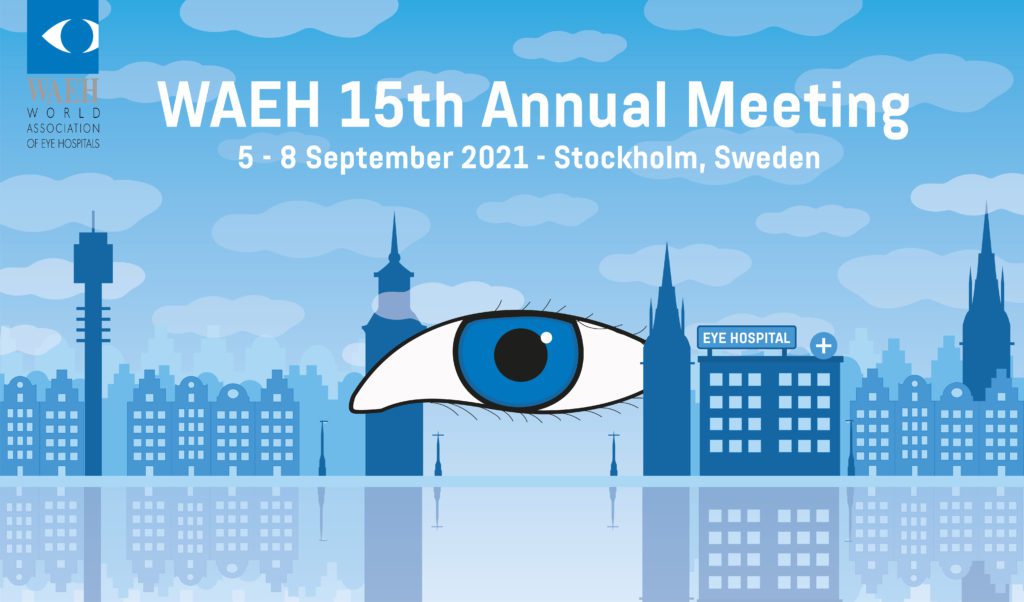
Call for Abstracts now open!
The 15th Annual WAEH meeting
Stockholm, Sweden
5 – 8 September 2021
Looking far and beyond – Learning from other industries and from our peers
Host: St. Erik Eye Hospital
WAEH 15th Annual Meeting themes:
2021 – Forward together – Developing the Eye Care of the Future.
1. The Eye Hospital of the Future
- Background philosophy
- Adaptability to new challenges and technical development
- Designing new eyehospitals
- The building process – To move a new hospital building – lessons learned
2. External Relations – Creating Collaborations between industry, academia and health care for the benefit of our Patients
3. The Eye Care of the Future – Trends and Outlooks
- Telemedicine
- Self-monitoring
- AI – screening
- Digitalization
Read more and submit your abstract here

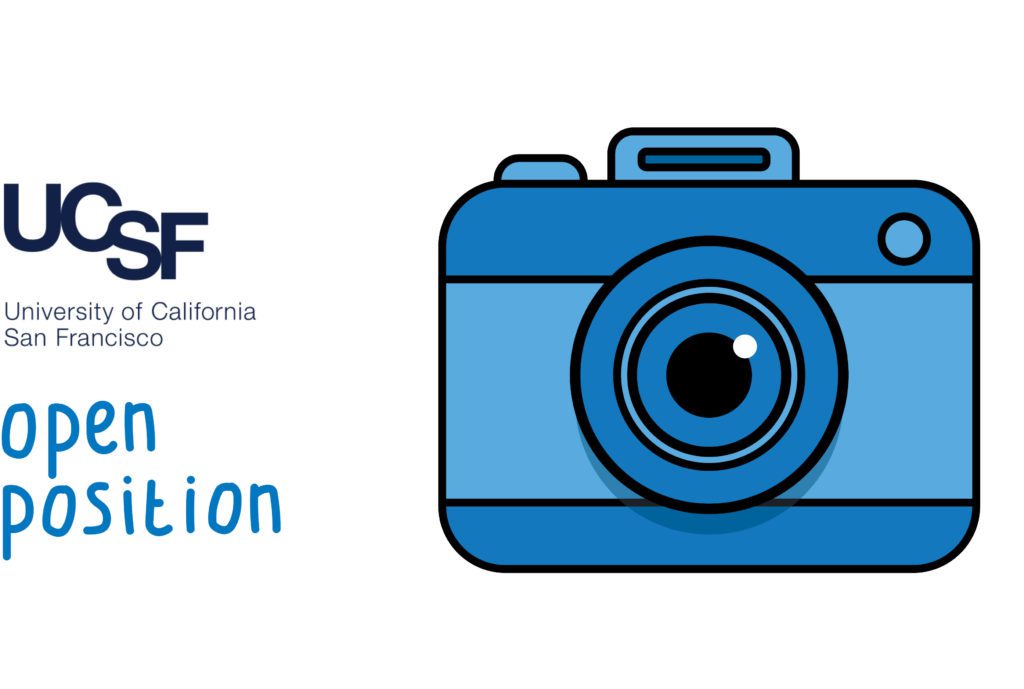
Open position – UCSF Department of Ophthalmology Photography position
The University of California, San Francisco (UCSF), Department of Opthalmology has opened two ophthalmic photographer positions that will be located at their new San Francisco downtown eye center, the UCSF Wayne and Gladys Valley Center for Vision.
The UCSF Department of Opthalmology is growing with their expanded space and are in need for imagers. They have recently revised their imager career tracks to enable advancement and promotion in line with industry accreditation, photographer association standards, and TJC. This enables their photographers to work at the top of their license, and have a pathway for advancement in their field.
Are you interested in this position? Apply here
Source: The University of California, San Francisco (UCSF), Department of Opthalmology

On the Hub: WAEH Data Policy
The mission of the World Association of Eye Hospitals is to facilitate the exchange of knowledge between members of the WAEH. For example, knowledge sharing takes place within projects, where data of individual members is shared and compared for the purpose of mutual learning. The WAEH data policy describes the provisions concerning data sharing between members and data sharing with new members and external parties.You can find the WAEH Data Policy on the Knowledge Hub
You can find the Data Policy on the Knowledge Hub under the ‘projects’ tab.
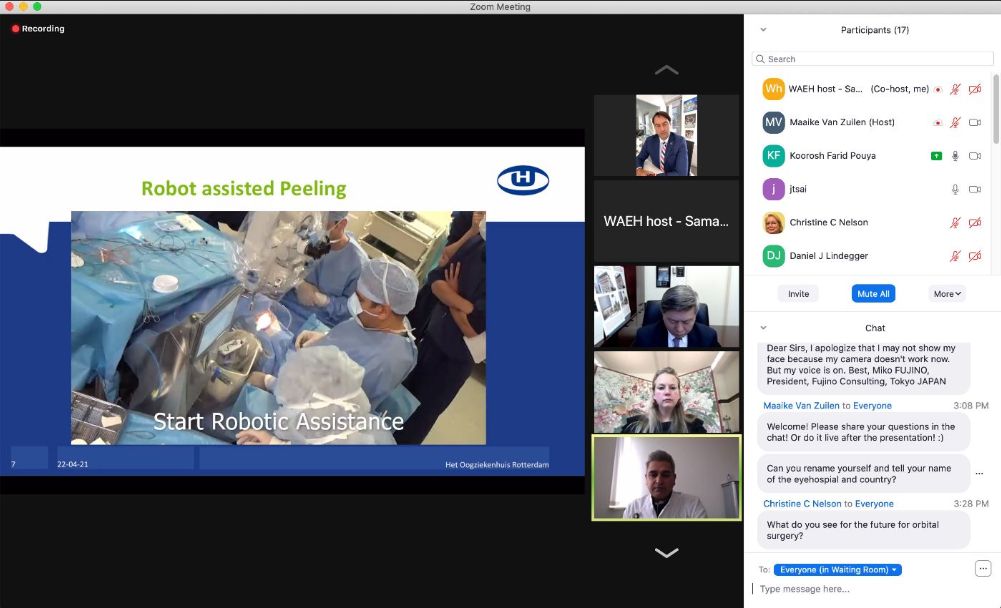
On the Hub: WAEH webinar recordings
The recording and presentation of the webinar of 22 April are now online!
Robotic Eye Surgery
The 22 April webinar presentation and recording about Robotic Eye Surgery are now online on the WAEH Knowledge Hub! Watch the recording and presentation here
Updated Login details – Knowledge Hub
From now on the Hub no longer has a personal login, but now the hub has a central login for all members. You can contact Maaike van Zuilen at: maaike.vanzuilen@waeh.org to request the login details.

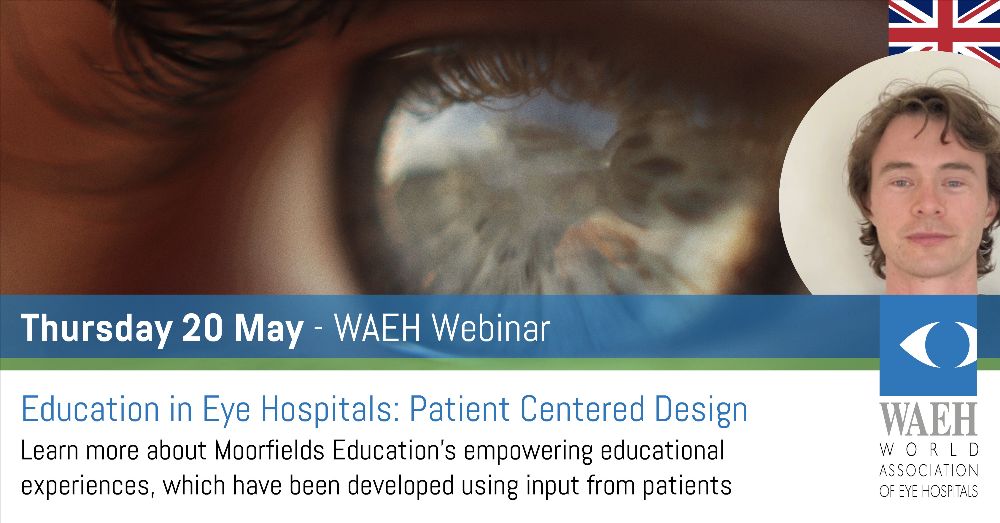
WAEH Webinar: Thursday 20 May
Webinar: Education in Eye Hospitals
Patient Centered Design
“Moorfields Education has designed six educational experiences to empower patients living with AMD, glaucoma and uveitis. They have been developed using patient centered design, where input from patients has been included from beginning to end.
Three advisory boards consisting of medical and non medical staff were set up to create and peer review the material made. This content was then designed to be accessible and interactive by educational professionals.” Marcus Pedersen is the learning technologist for Moorfields Eye Hospital and has overseen the development of this project.
Moderator: Maaike van Zuilen, Global Lead of the WAEH / Support Team
Speaker(s)
Marcus Pedersen
Moorfields Eye Hospital
Learning Technologist
Meet our new members from Maastricht (The Netherlands) and Chicago (U.S.A.) with introductions from:
Paul Chan, MD, MSc, MBA, FACS
Professor and Head, Department of Ophthalmology and Visual Sciences
The John H. Panton, MD Professor of Ophthalmology
Director, Pediatric Retina and ROP Service
Co-Director, Vitreoretinal Fellowship
Illinois Eye and Ear Infirmary (Chicago, U.S.A.)
Caroll Webers
Specialist at Maastricht University Medical Center Specialist
Professor of Ophthalmology
Chairman of the Medical Board.
The University Eye Clinic (Maastricht, The Netherlands)
Date: Thursday 20 May 2021
Theme: Education in Eye Hospitals
Time: to be announced
Register here
Suggestions or ideas about interesting and important eyecare and eye hospital topics and themes are welcome and can also be submitted via the Registration form. Welcome!!

WAEH Webinar: Thursday 24 June
Webinar: Pediatric Eye Care – Coping with The Covid Pandemic in Eye Hospitals worldwide
Time: to be announced
Moderator: Maaike van Zuilen, Global Lead of the WAEH / Support Team
Co-moderator:
Dr. Christine C. Nelson, MD, FACS from the Kellogg Eye Center, Board member of the WAEH

Dr. Christine C. Nelson, MD, FACS
Bartley R. Frueh, M.D. and Frueh Family Collegiate Professor
in Eye Plastics and Orbital Surgery
Professor, Ophthalmology and Visual Sciences
Professor, Department of Surgery, Plastic Surgery Section
Co-director, Kellogg Eye Center for International Ophthalmology
Section Leader, Eye Plastic, Orbital and Facial Cosmetic Surgery
Speaker
Kellogg Eye Center
What you can and can’t do virtually during Pediatric eye exams

Dr. Pamela Williams
Clinical Instructor, Ophthalmology and Visual Sciences
Kellogg Eye Center
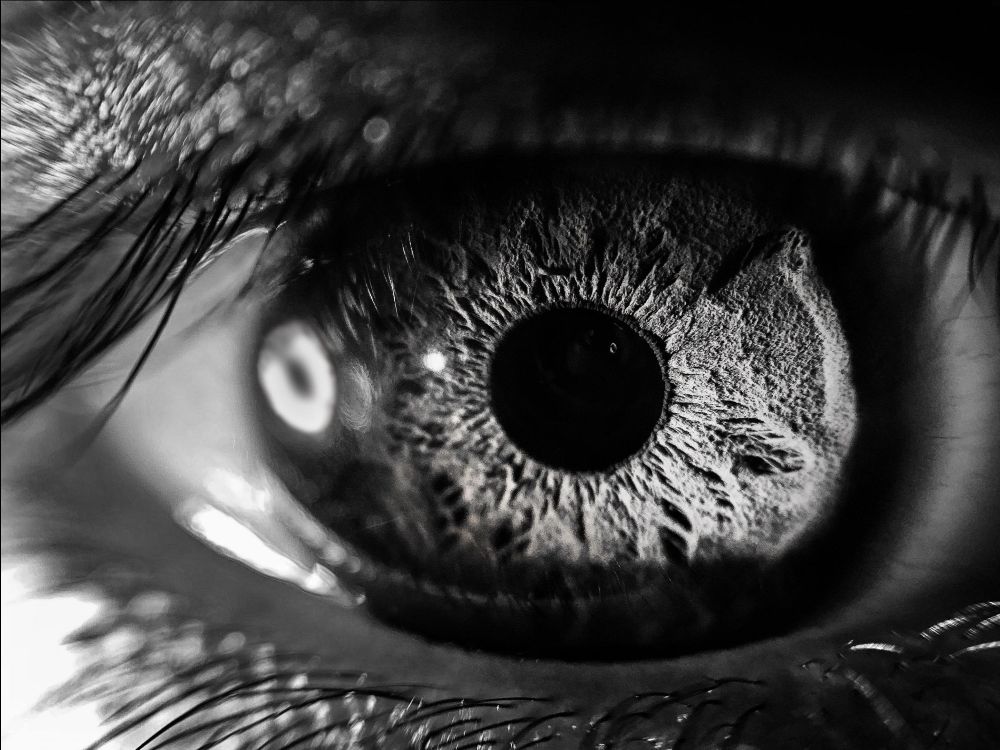
24 June 2021
14th Ophthalmological Symposium 2021 (online)
A Virtual advanced training event on the subjects of “Strabology and Neuroophthalmology”, “Lids”, Quality Research”. and “Medical Retina & Genetics” with internationally renowned personalities.
![]()
Time: 1.30pm – 5pm CEST
Date: 24 june 2021
Read more here
Source: Waid and Triemli City Hospital
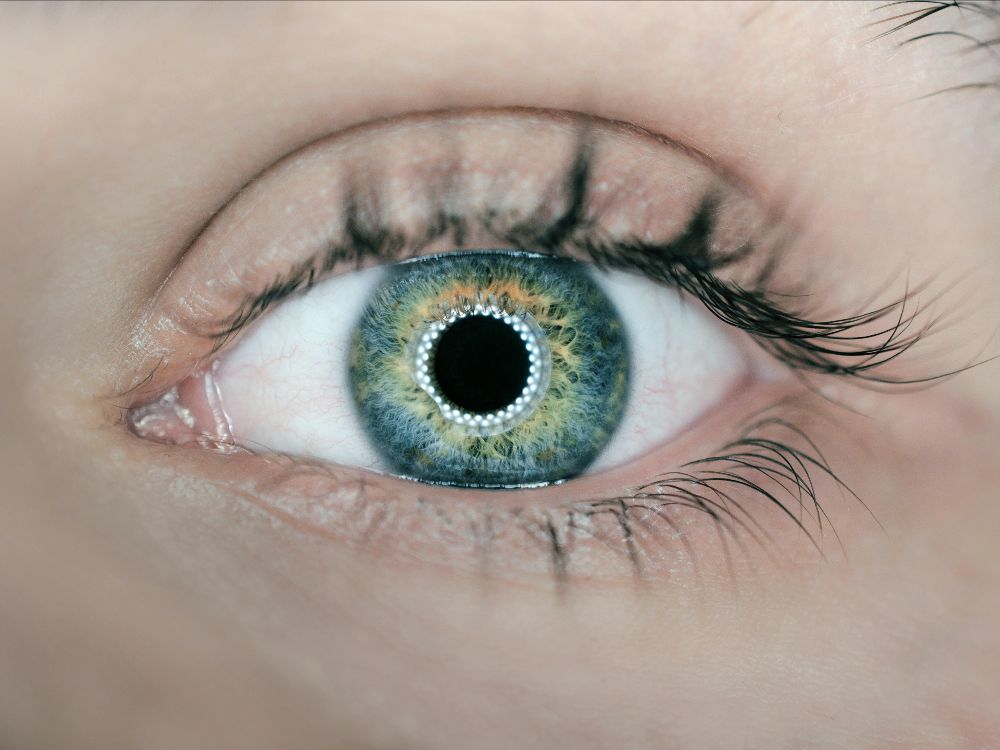
3 September 2021
The 32nd annual conference “Orenburg Conference of Ophthalmologists”
| Orenburg branch of S. Fyodorov Eye Microsurgery Federal State Institution will hold the 32nd annual conference “Orenburg Conference of Ophthalmologists” on September 3, 2021 and Prof. Alexander Chuprov would like to invite WAEH members to present a video of an interesting eye operation with comments of a surgeon. The theme is “Innovative approaches in Eye Surgery: cornea, lens, retina” Length of video: 7 – 10 minutes It is advisable to give the text sounding off-screen in Word format: The Orenburg Eye Institution will make subtitles for those who don’t understand English. We are looking for one more WAEH member to participate! Interested? Send an e-mail to: Maaike.vanzuilen@waeh.org and/or nauka@ofmntk.ru The deadline is August, 5th  Source: Orenburg branch of S. Fyodorov Eye Microsurgery Federal State Institution |

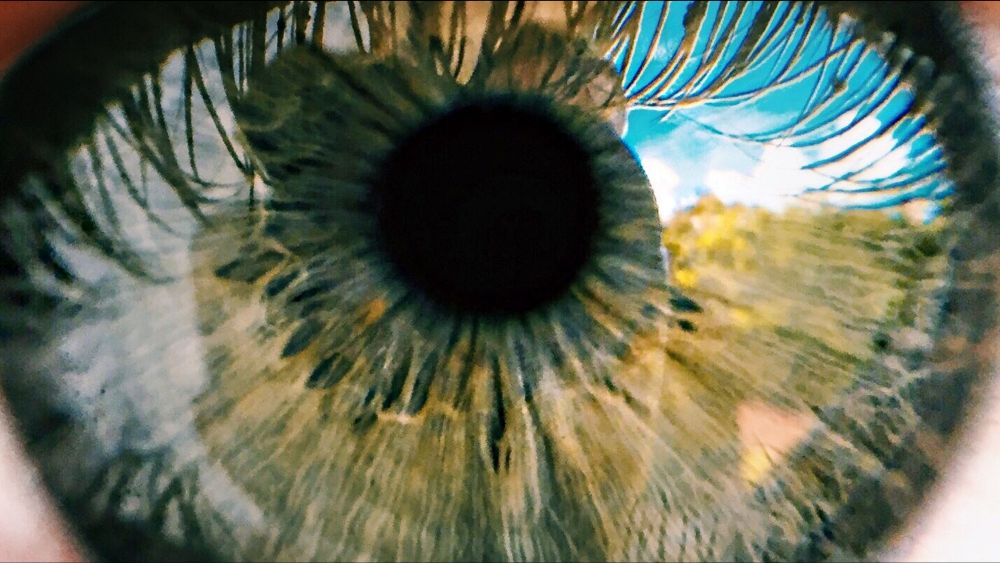
Health Services Research
Multi-stakeholder perspectives in defining health services quality indicators and dimensions
A concept mapping based comparison for cataract care between Singapore and The Netherlands
Abstract:
Objective
This study aims to advance understanding of globally valid versus country-specific quality dimensions and indicators, as perceived by relevant stakeholders. It specifically addresses patient-level indicators for cataract surgery.
Design A mixed-methods case study comparing Singapore and The Netherlands
Setting Singapore (2017–2019) and The Netherlands (2014–2015).
Participants Stakeholder representatives of cataract care in Singapore and The Netherlands.
Intervention
Based on the previously identified complete set of stakeholders in The Netherlands, we identified stakeholders of cataract care in Singapore. Stakeholder representatives then established a multi-stakeholder perspective on the quality of cataract care using a concept mapping approach. This yielded a multidimensional cluster map based on multivariate statistical analyses. Consensus-based quality dimensions were subsequently defined during a plenary session. Thereafter, Singaporean dimensions were matched with dimensions obtained in The Netherlands to identify commonalities and differences.
Results
19 Singaporean stakeholders representing patients, general practitioners, ophthalmologists, nurses, care providers, researchers and clinical auditors defined health-services quality of cataract care using the following eight dimensions: clinical outcome, patient outcomes, surgical process, surgical safety, patient experience, access, cost and standards of care. Compared with the Dutch results, 61% of the indicators were allocated to dimensions of comparable names and compositions. Considerable differences also existed in the composition of some dimensions and the importance attached to indicators.
Conclusions and relevance
This study on cataract care in Singapore and The Netherlands shows that cataract care quality measurement instruments can share a common international core. At the same time, it emphasises the importance of taking a country-specific multi-stakeholder approach to quality definition and measurement. Complementing an international core set with country-specific measures is required to ensure that the included dimensions and indicators adequately capture the country-specific quality views.
Read the full article here
Source: BMJ Journals
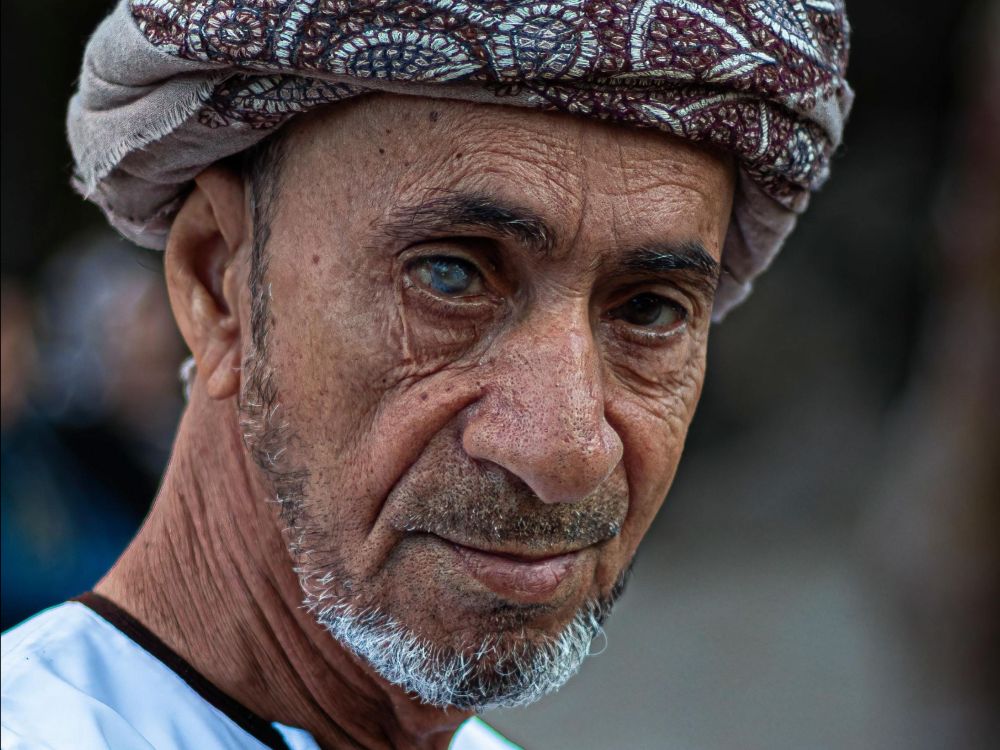
Clínica Oftalmológica Pasteur
Glaucoma is the 2nd irreversible blindness in the world
It tends to go unnoticed in people’s daily lives, as it tends to be confused with fatigue and some viral illnesses. Therefore, it is important that you know the symptoms of this condition that causes permanent blindness in the long term.
In addition, according to an article published by the WHO, Glaucoma is the second cause of definitive blindness in the world, and in Chile it affected 350 thousand people in 2018.
We already know that glaucoma can cause total blindness in the long term in the affected eye, but who are the most exposed people to suffer from this problem and what are some of the most common risk factors are:
- Have high internal pressure in the eye
- Be over 60 years old
- Family history of glaucoma
- Having illnesses such as diabetes, heart disease, high blood pressure, or sickle cell anemia
- Being extremely nearsighted or farsighted
- Having had an eye injury or certain types of eye surgery
- Taking corticosteroids, especially eye drops, for a long time
To better understand, glaucoma is a group of eye conditions that damage the optic nerve, the health of which is vital for good eyesight. This damage is often caused by pressure in the eye that is higher than normal and is a leading cause of blindness for people over 60, although it can occur at any age.
How to prevent Glaucoma?
There are many forms of glaucoma that do not have warning signs and their effect is so gradual that you may not notice a change in vision until the condition is in an advanced stage.
For this reason, it is very important that if you think you have some of the factors that we mentioned above, you visit an ophthalmologist.
In addition, it is important to have regular eye exams that include eye pressure measurements to be able to make a diagnosis in the early stages and treat it appropriately.
Source: Clínica Oftalmológica Pasteur
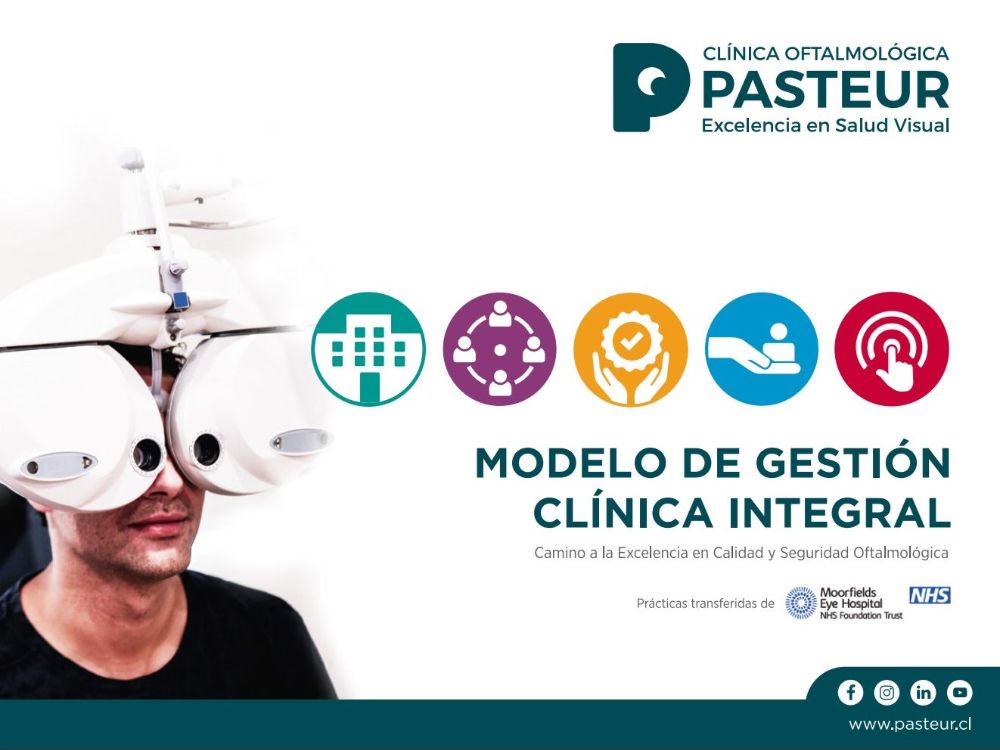
Clínica Oftalmológica Pasteur
Book – Comprehensive Clinical Management Model
Clínica Oftalmológica Pasteur has written a book! It’s about their history, Sense of Purpose, Vision, Mission, Values and Pillars, the Training of Ophthalmologists and Medical Technologists, how and why they see Moorfields Eye Hospital as a role model, their Clinical Management Model and more!
They have also mentioned their great relationship with the WAEH and how that benefits the visual health of their patients!
Read the book here
Source: Clínica Oftalmológica Pasteur
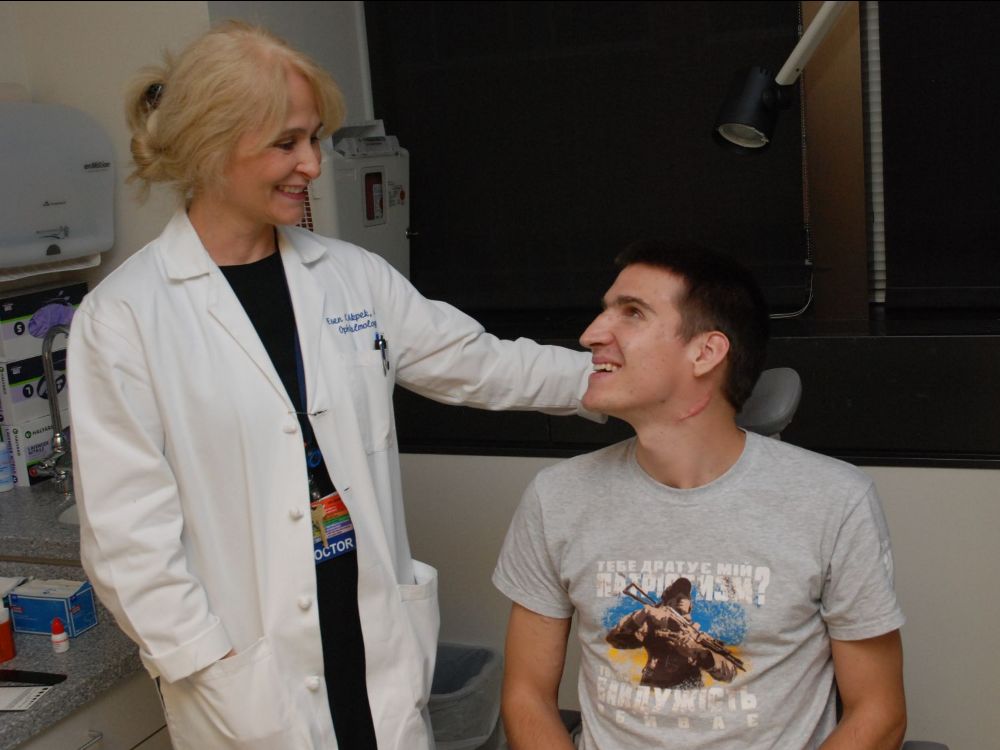
Wilmer Eye Institute
Oleksandr’s Story – A second chance at sight!
April 9, 2015, was a sunny day in Kyiv, Ukraine. Oleksandr Popruzhenko, a 20-year-old senior lieutenant in the Ukrainian army, was training a group of 15 soldiers on the proper way to lob a grenade. Shortly into the training session, a de-pinned grenade fell short and rolled into a nearby trench. Without hesitating, Popruzhenko dove for the grenade. Before he could throw it, the grenade exploded in his hands.
The force of the explosion threw Popruzhenko backward. He couldn’t see, and for a moment, he wondered if he was dead. But the pain convinced him he was still alive. Hundreds of grenade fragments had lodged under his skin and embedded in the muscles of his face, arms and legs — basically, anywhere that wasn’t protected by his bulletproof vest and helmet.
At a military hospital in Odessa, doctors tended to his wounds. They were able to remove most of the foreign bodies from his eyes, repair the corneal perforations, and flatten the detached retina in his right eye, but they couldn’t restore his vision. The left eye was beyond repair, they told him, and his only chance of regaining any vision in his right eye was to have a Boston keratoprosthesis corneal transplant, a highly specialized procedure that was not available in Ukraine.
Image: Dr. Esen Akpek with Oleksandr Popruzhenko – taken from The Wilmer Eye Institute story
Read the full inspiring story here
Source: Wilmer Eye Institute
Date: 12 March 2020
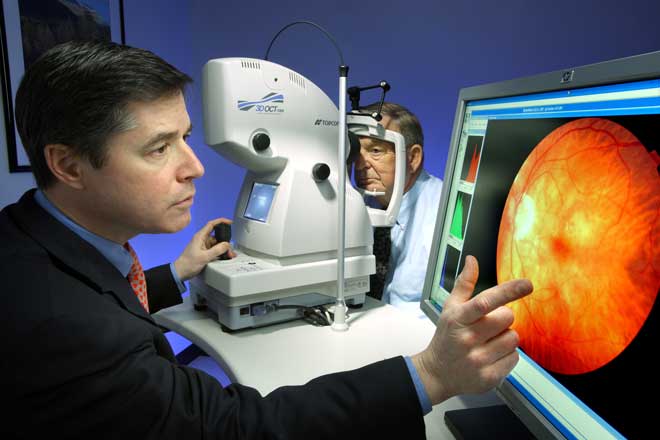
Wilmer Eye Institute
New AI Approach in Retinal Diagnostics Targets Inclusivity for Patients with Sight-Stealing Diseases
Diabetic retinopathy is the leading cause of preventable blindness in working-age adults. More than 2 in 5 Americans with diabetes have some stage of diabetic retinopathy, yet there are usually no symptoms in its early stages, when careful monitoring, and sometimes treatments, may be critical.
While ophthalmologists can readily diagnose the condition in the clinic by examining the retina, the sheer number of people with diabetes — more than 34 million in the U.S. and rising — makes periodic screening of everyone with diabetes by ophthalmologists prohibitive.
Enter artificial intelligence (AI). At its simplest, AI employs algorithms to allow computers to mimic human intelligence — for example, pattern recognition as used by ophthalmologists to recognize whether a patient has diabetic retinopathy. As AI technology has advanced, ever more elaborate programs have allowed corresponding advances in medical diagnostics.
Image: Neil Bressler, M.D., James P. Gills Professor of Ophthalmology at the Wilmer Eye Institute. Photo taken from the Wilmer Eye Institute website
Read the full article here
Source: Wilmer Eye Institute
Date: 9 September 2020
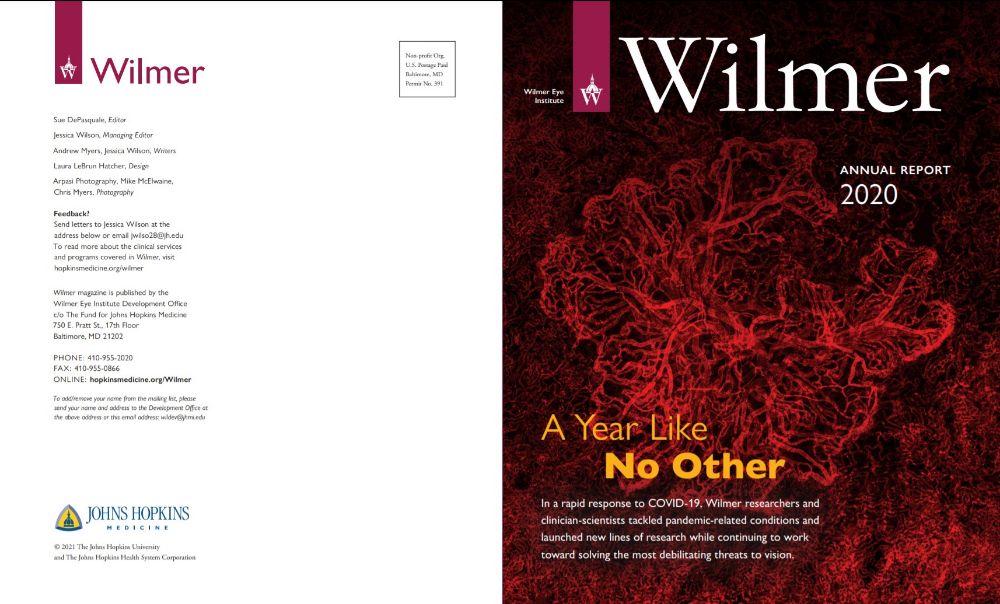
Wilmer Eye Institute
Wilmer Annual Report 2020 – COVID-19: Lessons Learned in the Clinic
The COVID-19 pandemic has required quick thinking and effective solutions to keep Wilmer patients and staff members safe during clinic visits.
The Wilmer Eye Institute has created a beautiful and informative 2020 Annual Report about the challenges that staff faced, during the global pandemic. You’ll learn about how they managed to overcome these challenges to keep Wilmer Staff and patients safe, to be able to provide quality Eye Care
Image: The cover of the 2020 Annual report by Wilmer Eye Institute
Read the full report here
Source: Wilmer Eye Institute
Date: 8 February 2021
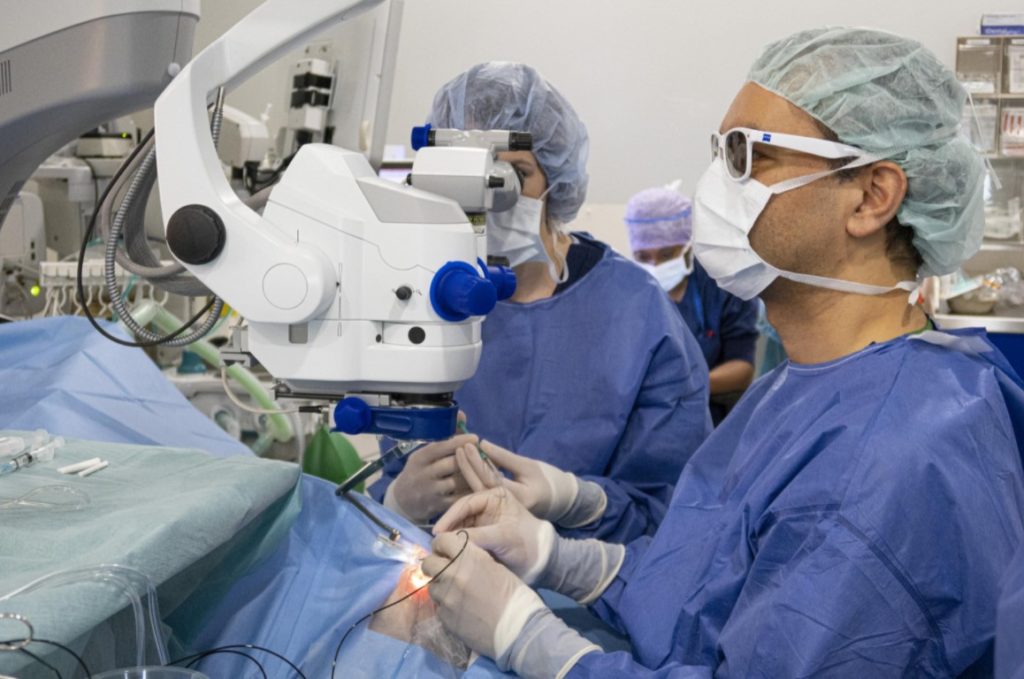
First gene therapy performed in The Netherlands at The Rotterdam Eye Hospital
The first retinal surgery with gene therapy in the Netherlands was performed on a 26-year-old man in Het Oogziekenhuis Rotterdam. By adding a healthy gene, the retina can start working better again. Without treatment, this patient will become blind in the foreseeable future.
Treatment with a drug called “voretigene neparvovec” has been developed for people with severe retinal disease due to an abnormality in one particular gene: the RPE65 gene. This rare condition, which is discovered in only one Dutch person every 1 to 2 years, is called “Leber congenital amaurosis”. Children with this hereditary eye disease are severely visually impaired from birth. Over the course of their lives, the function of the retina continues to deteriorate, leading to blindness from about the age of 40.
The Rotterdam Eye Hospital is very pleased to be able to perform this treatment as a top specialist hospital. “This new treatment can have a major impact on the quality of life for the people who qualify for it,” says Dr. Ingeborgh van den Born, ophthalmologist specialized in ophthalmogenetics (genetic abnormalities of the eyes).
Header image: The Rotterdam Eyehospital
Date: 22 March 2021
Read the full article here
Source: Het Oogziekenhuis Rotterdam
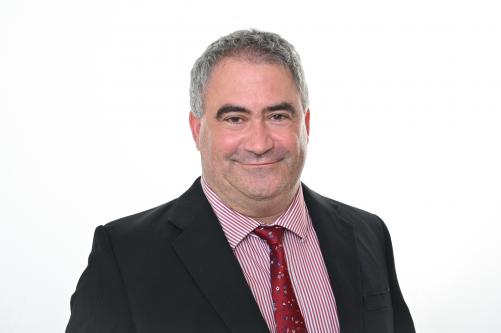
Moorfields Eye Hospital
Moorfields appoints new chief executive
Dr. Martin Kuper has been appointed as the New Chief Executive of Moorfields Eye Hospital NHS Foundation Trust.
Martin will join us from London Northwest University Healthcare NHS Trust, where he is currently deputy chief executive for transformation and chief medical officer.
Martin commented: “I am delighted to be offered the role of chief executive of Moorfields, a world-class centre of ophthalmic care, research and education at such a critical time in its development. Moorfields’ rich history, outstanding ophthalmic outcomes and reputation for innovation rightly makes it a leader, influencing change in the speciality in London, nationally and globally. I very much look forward to leading such a dedicated and talented workforce as we embark on the complex journey towards Oriel.”
David Probert will be leaving Moorfields in the summer and Martin will join later in 2021.
Header image: Dr. Martin Kuper – image taken from The Moorfields Eye Hospital article
Date: 30 April 2021
Read the full report here
Source: Moorfields Eye Hospital

Questions? Share news?
Do you have a special request? Would you like to organize a webinar or share news? Fill in this WAEH form
Or would you like to be (digitally) connected to a certain person in one of our member eye hospitals? Please feel very welcome to contact Maaike van Zuilen: Maaike.vanzuilen@waeh.org
